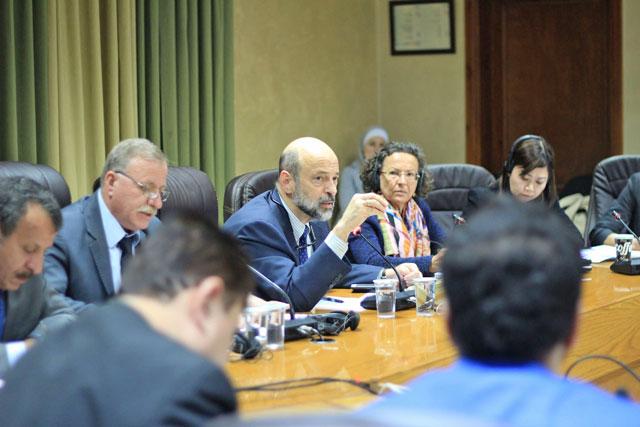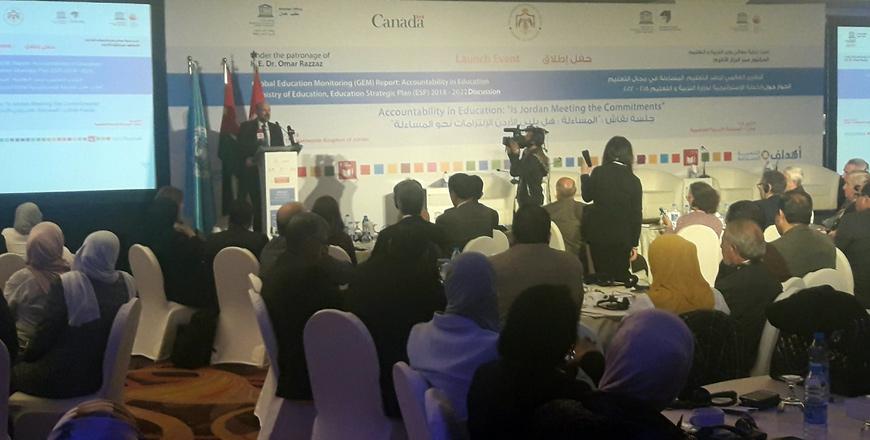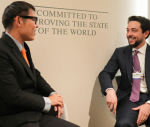You are here
'New education strategy needs strong partnership with local actors'
By Camille Dupire - Mar 14,2018 - Last updated at Mar 14,2018

Education Minister Omar Razzaz and UNESCO Representative to Amman Constanza Farina take part in a technical workshop in Amman on Wednesday (Photo courtesy of UNESCO Amman Office)
AMMAN — Following the launching event of the Education Strategic Plan 2018-22 a day earlier, the Ministry of Education (MoE) on Wednesday hosted a technical workshop on the coordination mechanisms and partnerships that will guide the implementation of the ESP.
Chaired by Education Minister Omar Razzaz, the discussions saw the attendance of ministry officials from all levels, members of the donor community and senior education specialists.
"A theoretical plan cannot succeed if it is not underpinned by strong and trusted partnerships with all actors," said Razzaz, stressing that "I am not only talking about officials from the ministry's central office, but also about all ministry employees in the directorates, educators and parents themselves".
"The first key principle of the ESP is that it is nationally owned and led. Being a national strategic plan, the ESP is first and foremost the responsibility of the Jordanian government," the minister pointed out, noting, however, the importance of development partners in supporting the sector at the central, field, directorate and school levels.
He praised the “extraordinary support” of the UNESCO Amman office and the International Institute for Education Planning, which he said "did not just hand us a prepared plan but gave us feedback throughout, advice about best practices and supported us the whole way", expressing his appreciation also to the Canadian government for its financial support to the ESP.
Coming from the graduate school of education at Harvard University, professor Haiyan Hua presented the best approaches to strengthen policy, planning and coordination mechanisms of the Jordanian plan, stressing “the real hard work starts now”.
He referred to the implementation of the plan and discussed ways to monitor, evaluate and keep track of the ESP objectives over the next five years.
Anchored in the goals of the National Strategy for Human Resource Development 2016-2025, the ESP aims to "enable the Kingdom to meet its goals for sustainable development, which includes the development of the nation in economic, cultural, social and environmental terms", according to the report.
Its mission is also to "ensure that current and future generations develop the skills and capabilities they need to live happy and fulfilled lives, and collectively realise the ambition of a prosperous and resilient Jordan".
Divided into sequenced and prioritised strategies and activities, the ESP looks at the issues of Early Childhood Development, basic and secondary education, vocational education, quality of the education system, human resources management and governmental expenditures, in line with the 2030 Agenda for Sustainable Development.
The representative of the Canadian government Shauna Flanagan touched on the importance of solid decentralisation efforts during the plan’s implementation, so as to support localised ownership of the strategy.
Following group discussions that engaged participants on the topic of partnerships and coordination mechanisms, Razzaz voiced hope for the concrete application of the plan, saying that “these brainstorming sessions have helped to clarify the next steps. Let us ensure that all of us, inside and outside of the ministry, continue to coordinate on the indicators and the priorities crucial to implementation”.
Related Articles
AMMAN — Representatives of the UNESCO Education Division on Tuesday presented the 2017-2018 edition of the Global Education Monitoring (GEM)
AMMAN — The Ministry of Education (MoE) in collaboration with the UNESCO Amman office on Tuesday launched the Education Strategic Plan (ESP)
AMMAN — On the occasion of the G-7 development ministerial meetings in Paris and the UNESCO International Conference, the government of Cana

















